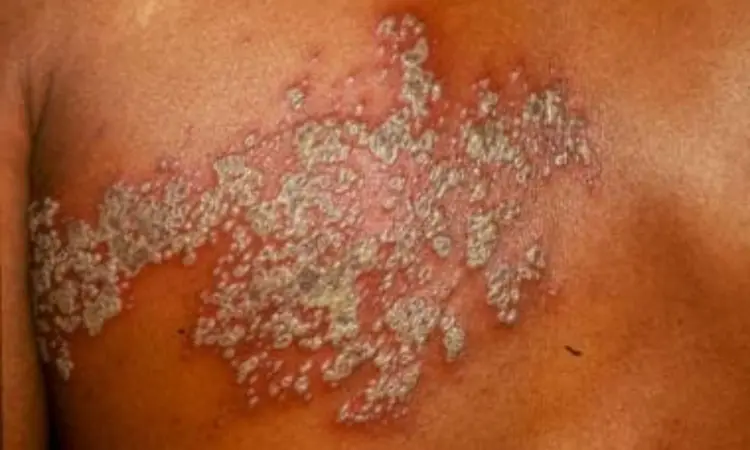- Home
- Medical news & Guidelines
- Anesthesiology
- Cardiology and CTVS
- Critical Care
- Dentistry
- Dermatology
- Diabetes and Endocrinology
- ENT
- Gastroenterology
- Medicine
- Nephrology
- Neurology
- Obstretics-Gynaecology
- Oncology
- Ophthalmology
- Orthopaedics
- Pediatrics-Neonatology
- Psychiatry
- Pulmonology
- Radiology
- Surgery
- Urology
- Laboratory Medicine
- Diet
- Nursing
- Paramedical
- Physiotherapy
- Health news
- Fact Check
- Bone Health Fact Check
- Brain Health Fact Check
- Cancer Related Fact Check
- Child Care Fact Check
- Dental and oral health fact check
- Diabetes and metabolic health fact check
- Diet and Nutrition Fact Check
- Eye and ENT Care Fact Check
- Fitness fact check
- Gut health fact check
- Heart health fact check
- Kidney health fact check
- Medical education fact check
- Men's health fact check
- Respiratory fact check
- Skin and hair care fact check
- Vaccine and Immunization fact check
- Women's health fact check
- AYUSH
- State News
- Andaman and Nicobar Islands
- Andhra Pradesh
- Arunachal Pradesh
- Assam
- Bihar
- Chandigarh
- Chattisgarh
- Dadra and Nagar Haveli
- Daman and Diu
- Delhi
- Goa
- Gujarat
- Haryana
- Himachal Pradesh
- Jammu & Kashmir
- Jharkhand
- Karnataka
- Kerala
- Ladakh
- Lakshadweep
- Madhya Pradesh
- Maharashtra
- Manipur
- Meghalaya
- Mizoram
- Nagaland
- Odisha
- Puducherry
- Punjab
- Rajasthan
- Sikkim
- Tamil Nadu
- Telangana
- Tripura
- Uttar Pradesh
- Uttrakhand
- West Bengal
- Medical Education
- Industry
Intravenous fosphenytoin promising treatment option for acute herpes zoster-associated pain

Japan: A recent study published in The Journal of Dermatology showed intravenous (IV) fosphenytoin promising as a potential alternative treatment for acute zoster-associated pain (ZAP).
The researchers reported a rapid analgesic effect of a single dose of IV fosphenytoin for acute zoster-associated pain in patients with Herpes zoster (HZ) for whom nonopioid drugs had shown an insufficient analgesic effect.
Herpes zoster is a common viral disease caused by reactivation of the varicella-zoster virus, which lies latent in the spinal dorsal root ganglia and cranial nerves after primary varicella-zoster virus infection. Most patients with herpes zoster develop acute zoster-associated pain. Nonopioid analgesics are usually used to treat acute zoster-associated pain but are frequently ineffective. Therefore, Masako Iseki, Juntendo University Faculty of Medicine, Bunkyo-ku, Tokyo, Japan, and colleagues administered IV fosphenytoin, the prodrug of phenytoin, to patients with acute zoster-associated pain to examine its analgesic safety and efficacy.
The researchers conducted a phase II, double-blind, placebo-controlled, randomized trial of intravenous fosphenytoin in Japanese inpatients with acute ZAP for whom nonopioid analgesics had shown an insufficient analgesic effect, at 13 medical institutions in Japan. The patients were randomly assigned in a ratio of 1:1:1 to receive a single intravenous dose of fosphenytoin at 18 mg/kg (high dose), a single IV dose of fosphenytoin at 12 mg/kg (low dose), or a placebo.
The study's primary endpoint was the mean change per hour (slope) in the numerical rating scale score from the baseline to 120 min after dosing.
Seventeen patients were randomly assigned to the low-dose fosphenytoin group (n = 6, median age 62.5 years), high-dose fosphenytoin group (n = 5, median age 69.0 years) and placebo group (n = 5, median age 52.0 years).
Because of investigational drug dilution failure, one patient was excluded. Owing to the impact of the coronavirus disease 2019, the study was discontinued.
The researchers reported the following findings:
- The slope was significantly lower in the high- and low-dose fosphenytoin groups than in the placebo group.
- Responsiveness to intravenous fosphenytoin (≥2-point reduction in the numerical rating scale score from baseline to 120 min after dosing) was inferred at plasma total phenytoin concentrations of 10–15 μg/mL.
- Treatment-emergent adverse events caused no safety concerns in the clinical setting, and intravenous fosphenytoin was well tolerated.
"Our findings found that intravenous fosphenytoin appears to be an effective and promising alternative treatment for acute zoster-associated pain," the researchers wrote.
The study's limitations include a limited number of patients examined, the duration of the analgesic effect (>2 h) of intravenous fosphenytoin given by a single dose requires further investigation, and the analgesic safety and efficacy of intravenous fosphenytoin given by repeated administration needs to be verified.
Reference:
Iseki, M., Yamamoto, T., Ogawa, Y., Majima, Y., Abe, Y., Watanabe, D., Amaya, F., Hasegawa, T., Inafuku, K., Kosugi, T., Nomura, Y., Deguchi, T., Hamada, T., Shimizu, K., Arai, S., Takahashi, M., Hamada, I., Ishikawa, Y., & Kawashima, M. (2024). Efficacy and safety of intravenous fosphenytoin for patients with acute herpes zoster-associated pain: A placebo-controlled randomized trial. The Journal of Dermatology, 51(2), 234-242. https://doi.org/10.1111/1346-8138.17054
Dr Kamal Kant Kohli-MBBS, DTCD- a chest specialist with more than 30 years of practice and a flair for writing clinical articles, Dr Kamal Kant Kohli joined Medical Dialogues as a Chief Editor of Medical News. Besides writing articles, as an editor, he proofreads and verifies all the medical content published on Medical Dialogues including those coming from journals, studies,medical conferences,guidelines etc. Email: drkohli@medicaldialogues.in. Contact no. 011-43720751


